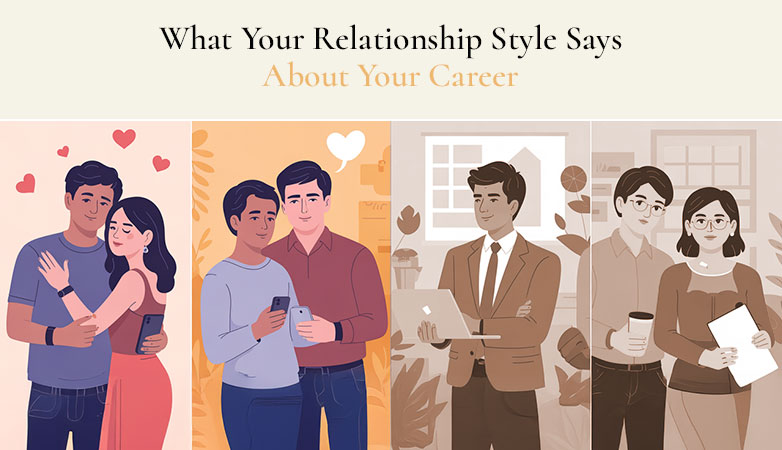Table Of Contents
- How modern careers influence romantic decision-making
- Dating habits shaped by work schedules and job demands
- The emotional toll of professional stress on intimacy
- Gendered expectations in work-life-relationship balance
- Why high achievers struggle with vulnerability in dating
- Money, stability, and its effects on dating confidence
- Communication breakdowns among career-focused partners
- How successful professionals can date mindfully
- Conclusion
- FAQs
How Modern Careers Influence Romantic Decision-Making
Let’s talk about something we rarely admit out loud
Your career isn’t just affecting your calendar. It’s shaping your love life.
If you’ve ever caught yourself wondering how career affects dating style, here’s your answer: more than you think.
A 2021 study published in the Journal of Social and Personal Relationships revealed that professionals often carry their work identity into their dating life, consciously or not.
Emotional availability, conflict styles, even how fast they open up? All impacted.
Translation?
Your LinkedIn title may say “Director” or “Founder,” but that mindset doesn’t switch off after 6 PM.
In high-stakes fields like law, tech, medicine, or finance, the same performance-driven focus that gets you promotions can quietly trickle into your relationship dynamics.
You might chase compatibility like a KPI. Or treat vulnerability like a risk assessment.
So if you’re wondering why your dating life feels more like a quarterly review than a connection, take a closer look at how your job might be calling the shots.
And once you understand how career affects dating style, you can start rewriting the story, on your terms.
Dating habits shaped by work schedules and job demands
If you’re juggling endless meetings, cross-continental travel, and 12-hour days, dating can start to feel… strategic. Not romantic. This is where your career’s influence on dating style becomes unmistakably clear.
Time management in relationships? It’s not just helpful, it’s non-negotiable.
For career-driven individuals, especially those in leadership or client-facing roles, finding time to date often turns into a logistical puzzle. And intimacy?
Sometimes it’s Balancing career priorities and personal life requires intentional space for romantic connection.
Time management in relationships becomes an act of love, not just logistics.
Common dating challenges for busy professionals:
Last-minute cancellations:
Your calendar shifts, and suddenly Friday night plans are bumped for a last-minute pitch deck.
Mental absenteeism:
You’re physically there on the date… but still mentally in that morning’s strategy call.
Sky-high standards:
Success in your career often comes with the side effect of expecting the same drive, and precision, from your partner.
And here’s what the data says:
According to Pew Research Center (2020), 45% of professionals say they don’t have enough time for a committed relationship.
That time scarcity often leads to a pattern of ‘transactional dating,’ where emotional depth takes a backseat to calendar compatibility.
So if your dating life feels like another item on your to-do list, you’re not alone, and it’s a sign to pause, not power through.
The emotional toll of professional stress on intimacy
Let’s talk about the hidden cost of high performance.
We know job stress can derail sleep, nutrition, even memory. But the impact of job stress on dating? That’s the piece most professionals miss, until it starts showing up in their relationships.
What stress actually does to romantic connection:
Short tempers:
Patience runs thin when cortisol runs high.
Low empathy:
You’re so emotionally spent at work, there’s nothing left to give at home.
Diminished sex drive:
Burnout impacts libido, and it’s more common than you think.
Independence masking disconnection:
You’re not distant because you don’t care. You’re distant because you’re overwhelmed.
A 2022 meta-analysis published in Personality and Social Psychology Review found that chronic professional burnout leads to significant drops in both partner satisfaction and healthy communication.
And yet, few draw the line between their job demands and the emotional availability in dating they seem to lack.
Your partner doesn’t need your productivity. They need your presence.
Gendered expectations in work-life-relationship balance
Here’s where it gets complicated. Work-life balance and relationships aren’t the same dance for everyone, because gendered expectations still shape the rhythm.
For many women, especially those in leadership:
- Ambition can become a double-edged sword.
- You’re applauded in the boardroom… but questioned in the dating world.
- You hear things like “intimidating” or “too busy to settle down.”
For men, especially in traditionally high-stakes careers:
- Emotional absence is often forgiven, disguised as ‘provider mode.’
- Stability is praised, even if intimacy quietly deteriorates.
A revealing study by Harvard Business School’s Gender Initiative showed that women who prioritized their careers were often seen as less dateable, even by men who claimed they respected ambition.
So yes, your professional life and romantic relationships are in conversation—and sometimes, society’s expectations speak louder than your intentions.
The takeaway? Relationship dynamics and career goals need to be rewritten on your terms, not inherited from outdated scripts.
Why High Achievers Struggle With Vulnerability In Dating
When you’re used to quarterly goals and performance reviews, opening up in love can feel like… a risk you don’t know how to measure.
Emotional availability in dating doesn’t come with a KPI. There’s no formula. No quick win. And for many high-achieving professionals, that’s deeply unsettling.
We often see clients who lead global teams yet feel lost navigating one-on-one intimacy.
Here’s why:
- Vulnerability feels like exposure: You’re so used to being in control that letting someone in feels like surrendering your edge
- Discomfort gets avoided, not explored: You’d rather fix, redirect, or work through, anything but sit with an uncomfortable emotion
- Needs feel like weaknesses: Admitting you want emotional connection? That can feel almost shameful in high-performance cultures
Psychologist Brené Brown describes this pattern as perfectionist self-protection. The fear? Being seen as ‘not enough’. At work, your achievements speak for themselves. But in love, it’s your presence that does.
And that’s the work, learning to stay, not solve.
Whether you’re navigating career-driven individuals and love life expectations, or struggling with emotional availability in dating, know this: vulnerability isn’t the opposite of strength.
It’s the foundation of connection.
Money, Stability, And Its Effects On Dating Confidence
Let’s talk about what no one warns you about: how career success and relationship satisfaction can clash when confidence turns into skepticism.
Sure, financial security looks great on a dating profile. You’ve built something real. You’ve earned stability. But here’s what the research says.
A 2020 Evolutionary Psychology study found that individuals with higher incomes often carry one quiet fear:
Are they dating me for who I am, or what I have?
That question, unspoken, but heavy, can shift your entire dynamic.
Money complicates dating in ways that don’t always show up on the surface:
- Splitting bills becomes a test: Does this signal equality or imbalance?
- Gifts feel calculated: Is it generosity or guilt management?
- Financial transparency becomes strategic: When do you reveal what, and to whom?
Even with all the stability in the world, love needs one more thing: authenticity.
If you’re someone who’s balancing career priorities and personal life, ask yourself, are you dating from abundance or from suspicion?
Because in the end, stability only strengthens love when it comes with emotional openness.
Communication Breakdowns Among Career-Focused Partners
You might be a killer communicator at work, concise, efficient, persuasive. But in love? That style might be leaving your partner feeling more managed than understood.
Let’s look at the real-life signs of communication breakdown:
- Overscheduled intimacy: You pencil in “quality time” like it’s a quarterly review
- Feedback mode activated: You default to feedback mode—offering fixes when softness is what’s needed.
- Mistaking updates for connection: “I’ll be home by 9” becomes the entire conversation
When professional life and romantic relationships start overlapping like this, it’s not about working harder, it’s about softening differently.
Ask less “How are we doing?” and more “How are you really feeling?”
How Successful Professionals Can Date Mindfully
Busy? Sure. But too busy for love? That’s a narrative you can rewrite.
Set intentions, not just reservations:
Instead of booking a dinner, ask: What kind of energy do I want to bring tonight? Presence beats planning.
Share the stress, softly:
Talk about your job pressures early on, not to offload, but to let them in. The impact of job stress on dating lessens when honesty leads.
Create micro-connection moments:
A call between meetings. A quiet coffee. You don’t need big gestures, just steady ones.
Rethink what “winning” looks like in love:
Your job rewards output. Relationships reward presence. Learn to value silence, softness, and space.
These tips help career-driven individuals and love life expectations meet in the middle—with more grace, less guilt.
Because mindful dating isn’t another checkbox, it’s how career-driven individuals create emotional clarity in the middle of chaos.
Conclusion
Your career and your love life? Never been separate stories.
How you text back, how you handle stress, how much time you make, it all reflects what you’re juggling at work.
You’re not bad at dating. You’re just used to leading with achievement.
But you can unlearn the rush. You can date differently.
Because once you see how career affects dating style, you start choosing with more clarity, and less autopilot.
At Sirf Coffee, we help career-driven individuals balance ambition and connection. If you’re stretched thin between career priorities and personal life, the right match might be just a click away.
FAQs
How does a demanding career influence one’s approach to dating?
It changes everything, from how you manage your time to how emotionally available you are. For many professionals, dating becomes transactional. You’re efficient, but intimacy suffers.
That’s why time management in relationships becomes critical.
Can professional success lead to challenges in romantic relationships?
Absolutely. The more you climb, the more guarded you may become. Success can bring job stress, trust issues, or even emotional detachment, especially if your identity is deeply tied to achievement.
What are common dating patterns among career-focused individuals?
Expect these: missed calls, rescheduled plans, and emotionally reserved conversations. There’s often a pattern of ‘on-paper’ connection but a lack of vulnerability.
It’s one of the biggest dating challenges for busy professionals.
How can professionals maintain healthy relationships amidst career pressures?
Start by being intentional. Redefine what success means in love. Open up about your stress.
And most importantly, learn how to balance your relationship dynamics and career goals without feeling like you’re failing at one or the other.


